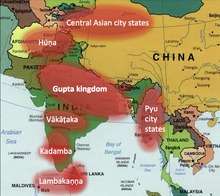Beyond Boundaries: Religion, Region, Language and the State
Beyond Boundaries: Religion, Region, Language and the State is a project funded by the European Research Council with research carried out at the British Museum, the British Library, SOAS, University of London, and Leiden University. The leading researchers are Dr. Michael Willis, Dr. Sam van Schaik, Dr. Nathan W. Hill and Dr. Peter Bisschop.[1] The project was one of thirteen synergy grants awarded in 2013 and the only synergy grant in the humanities for that year.[2] The project will run from 2014 to 2020.

Objectives
The project is focussing on the history and culture of early medieval India, specifically the period of the Gupta dynasty (circa 320-510 CE). Although characterised as a ‘golden age’ in modern scholarship — and marked by developments that shaped South Asia for more than a thousand years — research on this pivotal moment is fragmented and compartmentalised. The purpose of the project is to move beyond these limitations and to recover a more compelling picture of this influential period and its impact on India and her neighbours. The project achieves this aim through the development of online research tools, a series of workshops, and publications.[3]
Research Aims
The project is interdisciplinary in design and aims to:
- Investigate the constitution of the Gupta kingdom and its relationship with surrounding states
- Chart the polities that flourished concurrently in central and southeast Asia
- Define and analyse specific appropriations inspired by Indian examples and map how Sanskrit, Prakrit and Pali, the media of political and religious discourse, came to be used across Asia beside regional languages such as Pyu, Kannada and Khotanese
- Scrutinize how temples and monasteries emerged as autonomous socio-economic institutions with stable endowments, thereby possessing the resources needed to become long-standing trans-regional nodes of learning, ritual practice
Research Themes and Open Sources
Concerns about prevailing 'silos of knowledge' emerged primarily in management studies in the 1990s.[4] This analysis has had little impact beyond the commercial sector, however, especially in cultural and historical research where modern nation states, regional languages, and established disciplinary protocols have reinforced the status quo. In moving beyond these constraints, three research themes have been developed to cross the disciplines and regions covered by the project. The project design involves making all core data and analysis freely available online.
Allied Digital Humanities Projects
Selected project publications
- Hans T. Bakker, The World of the Skandapurāṇa (Leiden: Brilll, 2014). ISBN 9789004270091.
- Sam van Schaik, "Married Monks: Buddhist Ideals and Practice in Kroraina,"South Asian Studies 30 (2014), pp. 269–77. doi:10.1080/02666030.2014.962322
- Michael Willis, "The Dhanesar Kherā Buddha in the British Museum and the ‘Politische Strukturen’ of the Gupta Kingdom in India," South Asian Studies 30 (2014), pp.106-13. doi:10.1080/02666030.2014.962326
- Michael Willis, "Detritus to Treasure : Memory, Metonymy and the Museum," in Sacred Objects in Secular Spaces : Exhibiting Asian Religions in Museums, ed. Bruce M. Sullivan (London, Bloomsbury), pp. 145–52.
- Janice Stargardt and Michael Willis, eds., Relics and Relic Worship in Early Buddhism: India, Afghanistan, Sri Lanka and Burma (London: British Museum, 2018) ISBN 9780861592180
- Peter Bisschop, Universal Śaivism: The Appeasement of All Gods and Powers in the Śāntyadhyāya of the Śivadharmaśāstra (Leiden: Brill, 2018) ISBN 978-90-04-38246-6
- Nathan Hill, The Historical Phonology of Tibetan, Burmese, and Chinese (Cambridge: University Press, 2019)
References
- https://asiabeyondboundaries.org/about/ (Retrieved June 2016)
- "European Commission - PRESS RELEASES - Press release - ERC Synergy Grants: 13 frontier research projects to get €150 million". Europa.eu. 2013-12-18. Retrieved 2015-06-20.
- https://www.soas.ac.uk/south-asia-institute/events/asia-beyond-boundaries/ (Retrieved June 2016)
- For example: Lessard, Donald R., and Srilata Zaheer. "Breaking the Silos: Distributed Knowledge and Strategic Responses to Volatile Exchange Rates." Strategic Management Journal 17, no. 7 (1996): 513-33. https://www.jstor.org/stable/2486730.